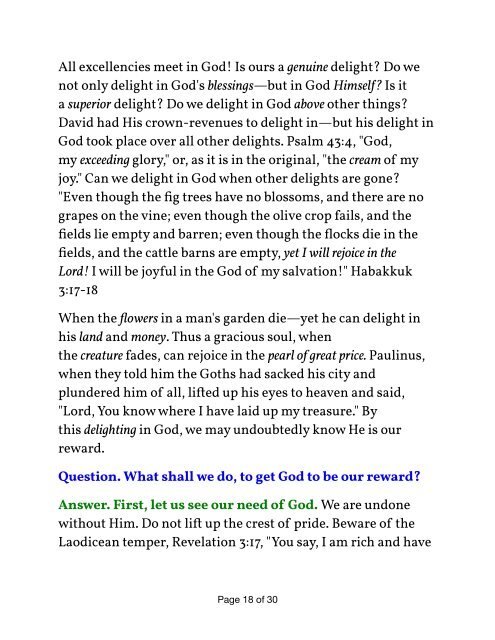God is His Peoples Great Reward by Thomas Watson 1620-1686
Thomas Watson is no doubt one of the most well-beloved of all of the Puritan authors. Few better guides have existed in this or any other area of spiritual experience than Thomas Watson. He was a master of both Scripture and the human heart, and wrote with a simplicity and directness that keeps his work fresh and powerful for the twenty-first century. Watson was educated at Emmanuel College, Cambridge, where he was noted for remarkably intense study. In 1646 he commenced a sixteen year pastorate at St. Stephen's, Walbrook. He showed strong Presbyterian views during the civil war, with, however, an attachment to the king, and in 1651 he was imprisoned briefly with some other ministers for his share in Christopher Love's plot to recall Charles II of England. He was released on June 30, 1652, and was formally reinstated as vicar of St. Stephen's Walbrook. Watson obtained great fame and popularity as a preacher until the Restoration, when he was ejected for nonconformity. Notwithstanding the rigor of the acts against dissenters, Watson continued to exercise his ministry privately as he found opportunity. Upon the Declaration of Indulgence in 1672 he obtained a license to preach at the great hall in Crosby House. After preaching there for several years, his health gave way, and he retired to Barnston, Essex, where he died suddenly while praying in secret. He was buried on 28 July 1686.
Thomas Watson is no doubt one of the most well-beloved of all of the Puritan authors. Few better guides have existed in this or any other area of spiritual experience than Thomas Watson. He was a master of both Scripture and the human heart, and wrote with a simplicity and directness that keeps his work fresh and powerful for the twenty-first century. Watson was educated at Emmanuel College, Cambridge, where he was noted for remarkably intense study. In 1646 he commenced a sixteen year pastorate at St. Stephen's, Walbrook. He showed strong Presbyterian views during the civil war, with, however, an attachment to the king, and in 1651 he was imprisoned briefly with some other ministers for his share in Christopher Love's plot to recall Charles II of England. He was released on June 30, 1652, and was formally reinstated as vicar of St. Stephen's Walbrook.
Watson obtained great fame and popularity as a preacher until the Restoration, when he was ejected for nonconformity. Notwithstanding the rigor of the acts against dissenters, Watson continued to exercise his ministry privately as he found opportunity. Upon the Declaration of Indulgence in 1672 he obtained a license to preach at the great hall in Crosby House. After preaching there for several years, his health gave way, and he retired to Barnston, Essex, where he died suddenly while praying in secret. He was buried on 28 July 1686.
- No tags were found...
Create successful ePaper yourself
Turn your PDF publications into a flip-book with our unique Google optimized e-Paper software.
All excellencies meet in <strong>God</strong>! Is ours a genuine delight? Do we<br />
not only delight in <strong>God</strong>'s blessings—but in <strong>God</strong> Himself? Is it<br />
a superior delight? Do we delight in <strong>God</strong> above other things?<br />
David had H<strong>is</strong> crown-revenues to delight in—but h<strong>is</strong> delight in<br />
<strong>God</strong> took place over all other delights. Psalm 43:4, "<strong>God</strong>,<br />
my exceeding glory," or, as it <strong>is</strong> in the original, "the cream of my<br />
joy." Can we delight in <strong>God</strong> when other delights are gone?<br />
"Even though the fig trees have no blossoms, and there are no<br />
grapes on the vine; even though the olive crop fails, and the<br />
fields lie empty and barren; even though the flocks die in the<br />
fields, and the cattle barns are empty, yet I will rejoice in the<br />
Lord! I will be joyful in the <strong>God</strong> of my salvation!" Habakkuk<br />
3:17-18<br />
When the flowers in a man's garden die—yet he can delight in<br />
h<strong>is</strong> land and money. Thus a gracious soul, when<br />
the creature fades, can rejoice in the pearl of great price. Paulinus,<br />
when they told him the Goths had sacked h<strong>is</strong> city and<br />
plundered him of all, lifted up h<strong>is</strong> eyes to heaven and said,<br />
"Lord, You know where I have laid up my treasure." By<br />
th<strong>is</strong> delighting in <strong>God</strong>, we may undoubtedly know He <strong>is</strong> our<br />
reward.<br />
Question. What shall we do, to get <strong>God</strong> to be our reward?<br />
Answer. First, let us see our need of <strong>God</strong>. We are undone<br />
without Him. Do not lift up the crest of pride. Beware of the<br />
Laodicean temper, Revelation 3:17, "You say, I am rich and have<br />
Page<br />
18 of 30

















